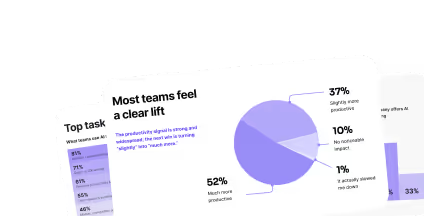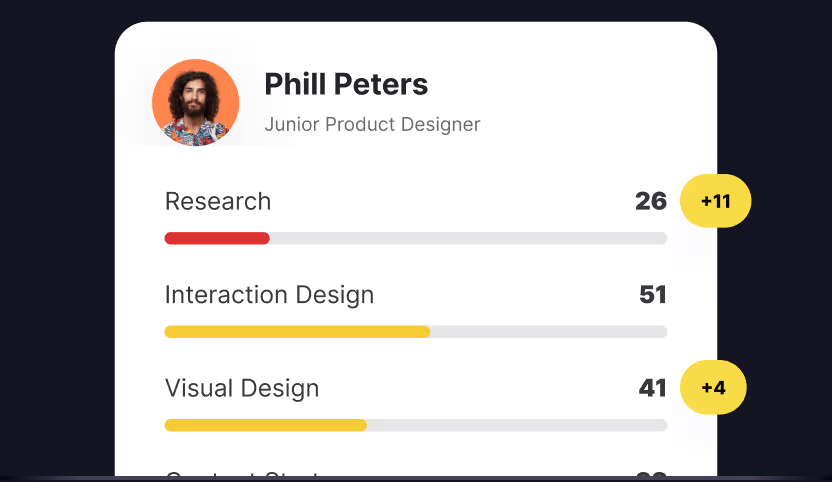Meet Brittany: Lead product designer at Roll20
As Lead Product Designer at Roll20, I manage a growing design team in a unique digital space where gaming and creativity intersect. Our small but mighty team currently consists of two designers—soon to be three—each tackling different aspects of our multifaceted platform. My role blends strategic leadership (60%) with hands-on design work (40%), giving me both oversight across all initiatives and practical insight into our daily challenges.
Roll20 operates at the fascinating intersection of B2B and B2C as a virtual tabletop platform. We enable players to enjoy games like Dungeons & Dragons and other tabletop role-playing games through any browser with an internet connection—no software downloads required. Beyond just facilitating gameplay, we've created a thriving marketplace where creators can develop and sell their own content, functioning essentially as "Etsy for D&D and other TRPGs."
Our design team structure reflects the diversity of our product ecosystem. Our senior product designer focuses exclusively on the virtual tabletop experience, while our junior designer leads development on our upcoming "Looking for a Group" feature. I remain unassigned to specific projects, instead conducting research and creating design solutions wherever they're most needed across our portfolio.
The challenge: Scaling skill development with limited resources
As a small team supporting multiple complex products, we faced significant challenges in maintaining consistent skill development and assessment:
Manual evaluation processes: Before Uxcel, I personally managed our quarterly design evaluations using Excel spreadsheets filled with dots indicating each team member's proficiency across various design disciplines. This approach consumed hours of valuable time that could have been spent on strategic initiatives.
Difficult baseline establishment: Determining appropriate skill baselines proved especially challenging for junior team members without traditional design backgrounds. Our junior designer struggled with her first self-evaluation because many of the categories were completely unfamiliar to her.
Limited visibility into growth: While we could track progress by comparing quarterly charts, this method provided only periodic insights rather than continuous visibility into skill development. The process was cumbersome and often failed to capture incremental improvements.
Time-intensive management: The manual nature of our approach meant that I was spending significant time on assessment administration rather than focusing on mentorship and strategic guidance for my team.
In a fast-moving industry where design capabilities directly impact business outcomes, these limitations threatened to constrain both individual growth and our collective ability to deliver exceptional experiences for our users.
The transformation: Automated skill mapping and gamified learning
Seeking a more efficient approach, I discovered Uxcel while researching performance review methodologies and skill evaluation frameworks. We were immediately drawn to the platform's comprehensive skill assessment capabilities and gamified learning approach—particularly fitting for our gaming-focused company culture.
The implementation transformed our approach to skill development in several key ways:
Automated skill assessment: Uxcel's skill tests allowed team members to objectively evaluate their proficiency across design disciplines, providing a standardized framework that eliminated the subjectivity of our previous approach.
Clear development visualization: The skill graph feature gave designers immediate visibility into their strengths and growth opportunities without requiring manual chart creation or complex spreadsheet analysis.
Conceptual education: Beyond just assessment, the platform provided essential education on design concepts—particularly valuable for our junior designer who lacked formal training. The platform explained terminology and taught fundamental concepts that might otherwise have required extensive 1:1 mentoring.
Gamified learning experience: The platform's interactive challenges, including visual training exercises and sensory activities, resonated deeply with our team's appreciation for gamification. This approach transformed learning from an obligation into an engaging activity that aligned with our company's gaming focus.
The adoption process was remarkably smooth, with enthusiastic support from the entire team. As a group dedicated to self-improvement, they immediately embraced the opportunity to gain objective insights into their capabilities and clear pathways for growth.
Business impact: Transforming management and professional development
While our implementation is still in its early stages, we've already observed significant positive impacts on both management efficiency and team dynamics:
Streamlined evaluation process: I've been relieved of numerous administrative responsibilities related to skill assessment, freeing up valuable time for strategic leadership and mentoring.
Enhanced baseline understanding: Our junior designer now has a clear conceptual framework for self-evaluation, allowing her to identify her initial skill level and track growth over time with confidence.
Team engagement in learning: The gamified elements have sparked genuine enthusiasm for skill development. One particularly memorable moment was when we gathered as a team to play a visual discrimination game, creating a fun, collaborative learning experience that strengthened both skills and team bonds.
Cultural reinforcement: The platform's gamified approach aligns perfectly with our company identity, reinforcing our values while delivering practical skill development. As a gaming company, we appreciate learning tools that embrace interactive, enjoyable approaches.
The automation of skill mapping has transformed what was previously a quarterly administrative burden into an ongoing, engaging development process. This shift allows us to maintain continuous awareness of team capabilities while focusing our energy on strategic initiatives rather than assessment administration.
Strategic insights for design leaders
Based on our experience transforming Roll20's approach to design excellence, I offer several insights for fellow design leaders:
1. Align learning approaches with company culture
The resonance between Uxcel's gamified learning approach and our gaming-focused company culture significantly enhanced adoption and engagement. By selecting tools that reflect your organizational values and working styles, you can achieve higher participation and enthusiasm for professional development initiatives.
For teams in creative industries, finding learning approaches that mirror your creative sensibilities can transform skill development from an obligation into a natural extension of your work.
2. Prioritize automated assessment for small teams
For small design teams with limited management bandwidth, automated skill assessment creates disproportionate value by reducing administrative overhead. By replacing manual spreadsheets with algorithmic evaluation, you can redirect leadership time toward activities that directly impact business outcomes and team growth.
This efficiency becomes increasingly important as teams scale. Our upcoming expansion to three designers would have further strained our manual approach, making automation not just helpful but essential for sustainable growth.
3. Leverage educational tools for junior Team Members
The educational component of skill development platforms provides particular value for junior team members without formal design backgrounds. These resources can establish conceptual foundations that would otherwise require extensive 1:1 mentoring, allowing experienced leaders to focus on advanced guidance rather than fundamental education.
This approach creates a more scalable onboarding and development path for new designers, essential for teams looking to grow while maintaining consistent quality standards.
Looking Forward: Building on Our Foundation
As we continue our journey with automated skill mapping, we anticipate several developments that will further enhance our design capabilities:
Longitudinal skill tracking: As team members retake assessments over time, we'll gain valuable insights into growth trajectories and the effectiveness of our development approaches.
Targeted learning initiatives: With clear visibility into specific skill gaps, we can implement focused learning initiatives that address our most pressing development needs.
Enhanced team composition decisions: Comprehensive skill mapping will inform our hiring and team structure decisions, ensuring we build a complementary team with diverse strengths.
By establishing this foundation of objective skill assessment and engaging learning experiences, we're positioning our design team to scale efficiently while maintaining the quality standards essential to Roll20's continued success in the competitive gaming market.
Our experience demonstrates that even small design teams can implement sophisticated skill development approaches when supported by the right tools. Through automation and gamification, we've transformed what was once an administrative burden into a strategic advantage that enhances both operational efficiency and team engagement.





.svg)
.svg)
.svg)
.svg)
.svg)
.svg)
